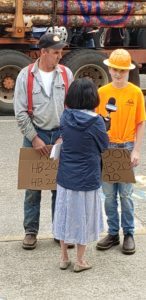 Timber Unity is a story about concerned truckers and loggers who educated themselves on issues, organized through social media, rallied to support each other, and ultimately made a difference. It is about a true grassroots movement, giving a voice to citizens that politicians can no longer ignore. Timber Unity should inspire anyone involved in forestry.
Timber Unity is a story about concerned truckers and loggers who educated themselves on issues, organized through social media, rallied to support each other, and ultimately made a difference. It is about a true grassroots movement, giving a voice to citizens that politicians can no longer ignore. Timber Unity should inspire anyone involved in forestry.
The story of Timber Unity began in June, during the final weeks of the Oregon legislative session. The supermajority party in Salem was preparing to provide Gov. Kate Brown a signature political achievement by approving House Bill 2020, also known as the “cap and trade” bill to impose arbitrary limits on greenhouse gas emissions.
Oregon produces a minuscule fraction of global carbon emissions. The state has already enacted laws to reduce emissions that haven’t even been implemented yet. Proponents concede the bill would have an imperceptible effect on global climate change, and some admit HB 2020 would disproportionally impact rural communities and low-income Oregonians.
All consumers would pay higher energy costs, including an immediate 22 cents per gallon fuel increase in 2021, a cost that balloons to $3 a gallon by 2050. Energy-dependent small businesses, including small logging and trucking operations that already operate on slim margins would be threatened.
Despite Oregon’s negligible contribution to global warming, Gov. Brown sought to elevate the state as a leader in climate policy. Proponents claimed HB 2020 would create “green energy jobs,” as billions of dollars generated from this complicated scheme would fund “social justice” causes and “re-training” for the thousands of blue-collar Oregonians who would lose their jobs. Though the bill was pushed by the most powerful politicians in the state, its political momentum crashed as more citizens became aware of this policy and learned their livelihoods and communities were at stake. Timber Unity was born.
 Only the original founders of Timber Unity can tell their stories, but it started when a handful of truckers and loggers learned about HB 2020 late in the legislative session. Several visited the State Capitol in early June and discovered the political odds they faced. They recognized the need to organize and come back to Salem in greater numbers if politicians were ever going to listen. Utilizing the power of social media, they formed a Facebook group under the galvanizing #timberunity hashtag. Ahead of its first rally on June 12, the Facebook group grew from a few dozen to several hundred.
Only the original founders of Timber Unity can tell their stories, but it started when a handful of truckers and loggers learned about HB 2020 late in the legislative session. Several visited the State Capitol in early June and discovered the political odds they faced. They recognized the need to organize and come back to Salem in greater numbers if politicians were ever going to listen. Utilizing the power of social media, they formed a Facebook group under the galvanizing #timberunity hashtag. Ahead of its first rally on June 12, the Facebook group grew from a few dozen to several hundred.
I was pleased to join the first rally and show support, guiding a group of about 75 truckers and loggers through the State Capitol. Though a few legislators welcomed them to Salem, chiefly State Representative Shelly Boshart Davis (R-Albany) and Senate Republican Leader Herman Baertshiger Jr. (R-Grants Pass), the group’s presence was largely ignored by legislators.
The group filled two committee rooms and watched as the party leadership replaced HB 2020 critic State Senator Betsy Johnson (D-Scapoose) on the Joint Ways and Means Committee and approved the bill on party lines. The bill would be sent to the Floors of the Oregon House and Senate, where many pundits and lobbyists predicted the bill would be passed and sent to the governor’s desk. The bill passed the Oregon House on June 17.
Salem politicians would have no idea what would come next, as #timberunity grew from several hundred to a few thousand. While it’s the third rally that will be remembered most, it’s the second rally, known as “Convoy II” on June 19 that set in motion a series of events that would lead to HB 2020’s demise. This time, over 200 members of the group arrived in Salem, with many staging about 50 log trucks at the Oregon State Fairgrounds for a demonstration at the Capitol.
 If politicians ignored Timber Unity the first time, they noticed the second time as log trucks circled the Capitol Mall and hundreds rallied on the front steps of the building. Consequently, it inspired 11 State Senators to temporarily leave the capital city, resisting calls by the Gov. Brown and legislative leadership for their arrest and return to Salem. Denied a quorum, HB 2020 could not receive a vote in the Senate. Over the coming days Timber Unity rallied in support of the Oregon 11, and on June 27, “Convoy III” would deliver the largest and most effective demonstration many of us have ever seen in Salem.
If politicians ignored Timber Unity the first time, they noticed the second time as log trucks circled the Capitol Mall and hundreds rallied on the front steps of the building. Consequently, it inspired 11 State Senators to temporarily leave the capital city, resisting calls by the Gov. Brown and legislative leadership for their arrest and return to Salem. Denied a quorum, HB 2020 could not receive a vote in the Senate. Over the coming days Timber Unity rallied in support of the Oregon 11, and on June 27, “Convoy III” would deliver the largest and most effective demonstration many of us have ever seen in Salem.
Convoy III brought thousands of truckers, loggers, sawmill workers and other Timber Unity supporters to the capital city. Understanding the threats, farmers and ranchers joined the effort. Hundreds of log trucks, forestry and farm equipment surrounded the capitol and brought downtown Salem to a standstill. Yet, Timber Unity participants did not disrupt public business as they engaged in a peaceful and civil demonstration. After the historic Convoy III was complete, all trash was picked up. On June 25, HB 2020 was declared dead by the Senate President, and Timber Unity now has over 50,000 members.
Today this grassroots force is working to gain a permanent structure, forming a political action committee and non-profit organization so it can continue to grow. On July 8, a key Timber Unity member had the opportunity to visit the White House for a presidential address. If you haven’t already, follow their Facebook page for updates. Timber Unity shows what happens when those in the forestry to get informed, get engaged to make their voices heard and make a difference. We should all follow their example.



